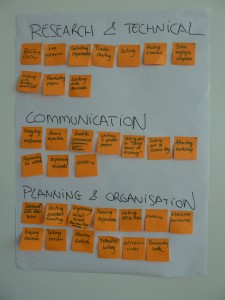Last week, I ran a career workshop at a research institute in the lovely city of Vienna. The participants were doctoral students keen to find out about the kinds of careers they could consider after their PhD. I asked them to come up with a list of careers where a PhD is (1) essential; (2) optional; and (3) not required.
It’s interesting that whenever and wherever I do this workshop exercise, participants usually come up with very few job options in each of these categories. This is partly because there are very few professions in category 1, where a PhD is essential (mainly research jobs), which restricts the number of jobs on the list. For categories 2 and 3, although there are far more jobs where a PhD is either optional or non-essential, doctoral students and researchers usually find it harder to think of examples. This is not surprising, since they are working in research, usually focussed on research-related careers and also have limited interaction with people in non-academic careers.
My own list below illustrates this point, i.e. it has a small number of professions at the top, where a PhD is essential, with many more choices appearing towards the bottom of the list, where a PhD is not required. Clearly the list is very limited, but it reflects the more popular career choices, which tend to be science-related.
Finding out about the range and types of non-academic careers available is one thing, making yourself a ‘marketable commodity’ of value to potential employers to these professions is quite another. For those jobs at the top of my list that require a PhD, associated academic research skills are a must, i.e. excellent laboratory skills, knowledge of biological systems, analytical and interpretative skills, not to mention writing, publishing, acquiring funding, teaching, supervising, etc. However, as you move down the list, away from the research and technical fields and more towards the PhD-optional type jobs, these kinds of specific research activities become more valuable in demonstrating personal and transferable skills, rather than to show knowledge of the latest gene for controlling drought tolerance in an obscure weed or the intimate goings-on in yeast.
The good news for PhD students and researchers is that you will have acquired plenty of these skills during the course of your research and, even if you can see skill gaps, there are usually opportunities to fill them by applying for summer schools and courses, getting involved in extra-research activities or even doing an internship. In this way, you can add to the repertoire of skills and capabilities required for particular professions (read job specifications to find out what’s on the menu) and also promote them in your CV (that’s another story!).
In my career workshop in Vienna, the PhD students audited all their work activities and then allocated them into skill groups. They were surprised by the number of skills they had acquired through their research work, and found it useful to compare with their peers. If you look at the range of work activities in the figure below, you’ll see tasks such as, ‘sharing expertise’, ‘planning experiments’ and ‘trouble-shooting’. Of course, these activities, and all of the others too, involve doing a whole lot more than these simple words on a sticky note can express. Breaking them down into further sub-tasks conveys a much more accurate picture of the skilled researcher: building relationships and collaborations, liaising with colleagues, explaining complex concepts, determining problems and using creative solutions to overcome them, investigating resources and designing new protocols. To name but a few!
You can do this exercise individually. Brainstorm all the work activities you do in your PhD or postdoctoral research, as well as associated activities and even personal interests if they are of relevance. You can then allocate these into skill groups such as those shown here. If your university is a member of Vitae, you can also make use of their learning log, the Researcher Development Framework, to help guide you in your personal and professional development.
As a skilled researcher, you have many career options to consider, and the skills you’re enjoying using right now will provide clues to the kinds of jobs which may be of interest to you. Use this knowledge to research potential careers, promote the information strategically in your applications and then be prepared to talk about it at interview.

